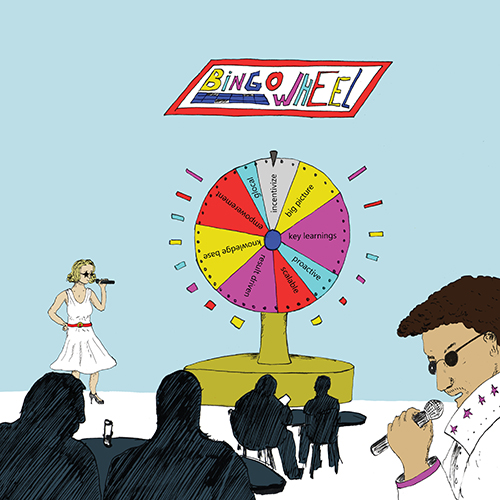The origins of boredom
French writer Jules Renard argues that “the fear of boredom is the only pretence for work”. He obviously never attended endless corporate seminars. For when it is work itself which produces the most incredible 'ennui', it therefore becomes the perfect excuse for entertainement and game-playing. Hence the birth and spread of the bullshit bingo, a worlwide known game with several names, different rules, but whose usefulness lies uncontested.
A game for all tastes
Different versions exist. The bravest employees will decide to yell “bingo!” in the middle of the presentation. Others will try to use the word, unnoticed, in a question. In the end, most people will simply exchange conniving smiles.
Its most creative use remains the one where everyone has to take a sip of coffee everytime one of the words is pronounced. At least, it has the benefit of hooking up all participants on caffeine, who will therefore leave the room over-excited and full of energy… instead of depressed, with an orphan look in their eyes.
Of course, there are many other ways of passing time during a boring seminar: answering your emails, playing at Candy Crush or 2048, organizing your schedule for the next few days, or simply taking a discrete nap. But bullshit bingo remains the most sophisticated solution.
Guilty or non-guilty?
It is even said that it establishes a solidarity between all who feel left out of the conference ; that it creates a light and casual work environment which improves the mood and efficiency of everyone ; some even state that, paying so close attention to the speech of the lecturer (waiting for the next bullshit word to be dropped), we are strangely much more receptive to what’s being said.
Although all these arguments may simply serve as justifying our devious tendancy for game-playing, the quick spread of bullshit bingo sheds some light on two important facts: the obvious failure of many conferences filled, it not with air, simply with economic giberrish and managerial poppycocks ; and the incredible ability of games, entertainment, and humour in general to adapt to situations and seminars often inadequate.
A counterproductive manichaeism
For this is the issue at hand here : the survival skills of games such as the bullshit bingo which constantly adapt and constitute an important part of the informal culture of companies.
Why then leave this whole segment of the corporate culture in the unsaid and occult? The less the seminars will prove able to deliver their promises, the more these practices will gain in popularity and legitimity.
Why not turn them into the driving force of successful conferences, instead of symptoms of failed ones? Why not incorporate such tools, methodologies, entertainments into the very process of work and value creation?
Games will always find a way to adapt. Now remains the question of whether or not working methods can change in the right direction. Because in the end, the best way not to be bored during conferences is not to find the most elaborate distraction. But to organize conferences and work sessions which can implicate, interest and motivate the participants.
Illustration by Germain Jammernegg.
